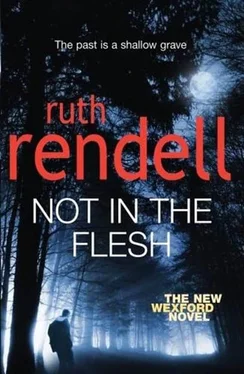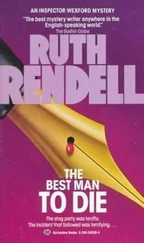She picked up a chocolate biscuit off the plate Greg had brought, laid it down again, and selected instead one with a crust of coconut icing. “I didn't talk about it. The less said about it the better, I thought. It was best forgotten.”
He marveled, not so much at her as at the society she had moved in that bred such dismissive indifference to a man's death. “Did your husband talk to you about it?”
“Ronald wanted to bury the body. He said it wasn't safe leaving it there. John Grimble or whatever his name is, he might find it. All I said was he shouldn't try to do that on his own, move it and bury it, I mean. He didn't ask me to help again. It was too much to expect of me.”
“Did he try to bury the body?”
“Of course he didn't,” said Mrs. McNeil. “It was in the cellar, wasn't it, when you found it? Ronald wasn't strong enough. He was nearly eighty, he wasn't well. It hurt his back when we had to move the body down those stairs. I shall always say it was that which damaged his hip. I told you it was the day after that he had a stroke and he wasn't strong enough to have a hip replacement. He wouldn't have stood the anesthetic.”
It was a grotesque and nightmarish picture she had conjured up, these two aged and no doubt misshapen people, limping and short of breath, struggling and gasping as they humped a dead man down a narrow staircase into a subterranean chamber. “Why do you think Miller was in the house?” Wexford asked.
“Looking for something to steal,” she said promptly. “And then he went to wash himself. That would be stealing too, wouldn't it, stealing Mr. Grimble's water?”
Wexford left her and returned to Flagford. The sun was low in the sky, creating a dazzling glare that the sun visor on the wind-screen did little to remedy. Grimble's Field had become a haven for rabbits, which scattered for the shelter of the trees when Wexford walked up the path. The bungalow had already been searched twice, but he still thought taking a third look might be worth a try. The first thing he did was turn on the cold taps in the bathroom, one over the bath and one on the washbasin. To his surprise-he had never fully believed in the theory that Miller had gone in there to wash himself or have a bath-water came from both. Not a gush or even a steady stream of water but a good deal more than a trickle. It would have been easy to fill the washbasin and not too unpleasant to wash in it in September. The sliver of soap was still there, cracked and blackened now. The shaving brush and the scrap of gray toweling were still there. But the knife…?
Since they must both have known there was a chance of the body being discovered in the cellar, it would have been very much in Ronald McNeil's interest to place the knife near the body. But was there ever a knife? Bridget Cook had told Hannah he carried one “for his own protection,” an excuse Wexford had heard many times before. In spite of all the searching that had been done, could the knife still be in here? Wexford surveyed the bathroom, which must have been a squalid place even while in daily use by old Grimble. Watermarks and rust stains disfigured taps and plug-holes. All the pipework was exposed or wrapped in dirty rags and several tiles had come away from the side of the bath. The floor had been deep in dust but most of that had been swept up by the searchers. He knelt down on the cleanest spot and peered at the floorboards.
Moving his hands through the drifts of powdery yet gritty gray stuff that had accumulated behind the lavatory pan, he pushed his forefinger down a space between the boards. There was nothing to be seen, but his finger encountered some kind of obstruction. What he needed was a knife (a knife!) to slide down into the crack. He went into the kitchen, opened a likely-looking drawer, and found a handful of ancient and rusty cutlery. The knives were far too blunt to stab anyone or be, as far as he could see, of any use at all except perhaps the use he had in mind for one of them. He returned to the bathroom, slid the rusty blade down into the crack, and pushed until it half-lifted the obstruction, something small and cylindrical. Easing it out, he blew the dust from it and saw that what he had found was a cartridge, probably, almost certainly, from a twelve-bore shotgun.
That, at any rate, proved Mrs. McNeil's story. How much now did it matter if the mystery of the knife was never solved? Whether McNeil had killed in self-defense or in malice hardly mattered, either. He was dead and the only offense with which his widow could be charged was that of concealing a death. If Grimble ever got his planning permission, would anyone want to live in a house (or two houses or three) built here, where two murders had happened, where two bodies had been hidden? Wexford was thinking about this, imagining himself as a potential buyer, when he heard a door close softly and a footstep in the kitchen.
He turned around, finding himself in the same position as Miller must have been when he was surprised by McNeil entering the house. This intruder, however, wasn't carrying a shotgun. Claudia Ricardo said, without polite preamble, “I saw your car outside with that driver of yours in it.” Why was “that driver of yours” so much more offensive to Wexford than “your driver”? The words meant the same thing. “It seemed an opportunity to get some facts out of you.”
He said nothing, waited.
“Is it true that was Dusty's body you found in here?”
“Yes, it's true.”
“And he'd been dead for eight years? Murdered? How funny. And it was eight years in September?”
“It would seem so,” said Wexford.
“If only we'd known,” she said, as if to herself. “That's why he never came back. I thought he'd come back, I really did.”
The thought came to him then that this woman, attractive in a bizarre way, had been sexually involved with Miller. Not perhaps in 1998 but three years before that. In jeans and clinging red sweater, she looked younger than when she wore her long skirts and “hippyish” patchwork. She pushed her hands through her hair, the movement lifting her cheeks and giving youth to her face. Silent for a while, apparently speculating, she said, “What happened to the money?”
“The thousand-” he said deliberately, “I mean, the hundred-pound wedding present?”
She wasn't the kind of woman who blushed, but her eyes narrowed.
“I can't tell you that, Miss Ricardo,” he said. “Now it's your turn to tell me something. When Miller came to you eleven years ago, worked for you as a handyman and drove your car, did he bring you the manuscript of a novel for Mr. Tredown to read?”
A strange expression had come into her face, calculating and sly. “Whatever makes you ask?”
“Perhaps you'd just answer the question.”
“Only if we can go and sit down somewhere. Have a little tête-à-tête? This place is a hole and a dump, but it's not as foul as this in the bedroom.”
The stench of old clothes and mothballs was unpleasant. Mice had been eating the old flock mattress. It was strange, Wexford had sometimes thought, how rodents could eat unpalatable, nutrition-free substances and apparently thrive on them. “Now perhaps you'd answer the question,” he said again.
She shrugged in a way that managed to be offhand and involved at the same time. He noticed how long her neck was, a desirable feature in a woman. “Yes, well, people were always sending him manuscripts,” she said, contempt in her voice. “It was him teaching in creative writing schools that did it. They'd go along and sign up or whatever they did, poor deluded creatures, and go to his classes and most of them got crushes on him. He used to be quite good-looking-we were known as a handsome couple-would you believe it?” When she saw Wexford didn't intend to answer her, she shrugged and went on, “Of course he only did it for the money. He had to, since he didn't make much from his books. I've never worked-did you know that? Never. Maeve did. She was someone's secretary. But me, I never fancied working. You have to get up so early in the morning. The people Owen taught, they'd go home and write something, usually some derivative rubbish or so boring you wouldn't believe. They'd send it to him asking for his comments. We got divorced and he married Maeve. She had an income from somewhere, not much, but better than nothing. Those manuscripts, Maeve and I used to read bits of them out loud and have a laugh, it was most amusing. Owen read them all, he was sorry for the people who wrote them, and he'd spend good money on the return postage.”
Читать дальше











